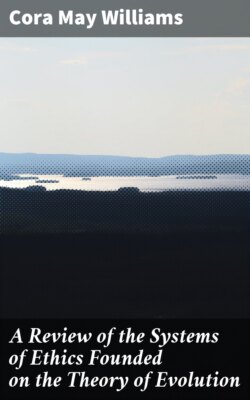Читать книгу A Review of the Systems of Ethics Founded on the Theory of Evolution - Cora May Williams - Страница 16
На сайте Литреса книга снята с продажи.
The Biological View
Оглавление"The truth that the ideally moral man is one in whom the moving equilibrium is perfect, or approaches nearest to perfection, becomes, when translated with physiological language, the truth that he is one in whom the functions of all kinds are duly fulfilled." Either excess or defect in the performance of function results in a lowering of life, for the time being at least. Hence, the performance of every function is, in a sense, a moral obligation. One test of action is thus given us. An action must be classed as right or wrong in respect of its immediate bearings, according as it does or does not tend either to the maintenance of complete life for the time being or the prolongation of life to its full extent. This is true even though the remoter bearings of the action may call for a different classification. The seeming paradoxy of this statement results from the tendency, so difficult to avoid, to judge a conclusion which presupposes an ideal humanity, by its applicability to humanity as now existing. In the ideal state, towards which evolution tends, any falling short of function implies deviation from perfectly moral conduct.
"Fit connections between acts and results must establish themselves in living things, even before consciousness arises; and after the rise of consciousness these connections can change in no other way than to become better established. At the very outset, life is maintained by persistence in acts which conduce to it and desistence from acts which impede it; and whenever sentience makes its appearance as an accompaniment, its forms must be such that in the one case the produced feeling is of a kind that will be sought—pleasure, and in the other case is of a kind that will be shunned—pain." So, in the case of the seizure of food, for example, "the pleasurable sensation," everywhere where it arises, must be itself the stimulus to the contraction by which the pleasurable sensation is maintained and increased; or must be so bound up with the stimulus that the two increase together. "And this relation, which we see is directly established in the case of a fundamental function, must be indirectly established with all other functions; since non-establishment of it in any particular case implies, in so far, unfitness to the conditions of existence." "Sentient existence can evolve only on condition that pleasure-giving acts are life-sustaining acts."
It is true that, in mankind as at present constituted, guidance by present or proximate pleasures and pains fails throughout a wide range of cases. This arises throughout evolution by changes in the environment, from which result partial misadjustments of the feelings, necessitating readjustments. This general cause of derangement has been operating on human beings in the changes from a primitive to a civilized condition through the direct opposition and struggle of the militant and the industrial spirit, in a manner unusually decided, persistent, and involved.
But there is a still further relation between pleasure and welfare to be considered. There are connections between pleasure in general, and physiological exaltation, and between pain in general and physiological depression. Every pleasure increases vitality, every pain decreases vitality. Non-recognition of these general truths vitiates moral speculation at large. "'You have had your gratification—it is past; and you are as you were before,' says the moralist to one; and to another he says: 'You have borne the suffering—it is over; and there the matter ends.' Both statements are false; leaving out of view indirect results, the direct results are that the one has moved a step away from death, and the other has moved a step towards death."
However, it is with the indirect results that the moralist is especially concerned; since remote consequences of action are especially to be considered in ethical questions. But doubtless a better understanding of biological truths would be to the benefit of moral theory and society at large.
Spencer especially combats, in a note at the end of this chapter, Barratt's theory, stated in "Physical Ethics," that movements of retraction and withdrawal and movements that secure the continuance of the impression of any acting force, are the external marks, respectively, of pain and pleasure. A great part of the vital processes, even in creatures of developed nervous systems, are carried on by unconscious reflex action, and there is, therefore, no propriety in assuming the existence of what we understand by consciousness in creatures not only devoid of nervous systems but devoid of structures in general. It is more proper to conceive such feelings as arising gradually, by the compounding of ultimate elements of consciousness.
